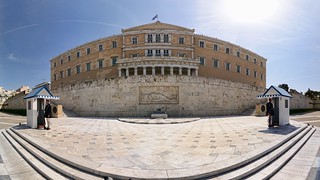 |
| Greek Parliament (Photo credit: duerrfk) |
In the bill's preamble, it is mentioned that "in Greece the high state funding resulted in the dependence of most [political] parties by the State."
According to a combined report from the state news agency and kathimerini, one of the most significant changes in the new bill is that it reduces the parties' state funding to 0.05% of the realized net revenue of the annual state budget report of the previous year, down from 0.102% of the regular revenue of the current year's state budget.
This basically means the funding of political parties will now be calculated against realized, not anticipated economic figures.
State funding to political parties as well as coalitions for electoral purposes are now going to be reduced to 0.008% of the realized net revenue of the annual state budget report of the previous year, down from 0.022% of the regular revenue of the current year's state budget.
Another good provision is that the bill also prevents parties from obtaining bank loans by using future state funding as collateral.
(It should be noted that the above was a popular tactic for parties until now and has led to ruling coalition partners New Democracy and PASOK owing around 250 million Euros to local banks.)
All political parties will only be allowed to have up to three bank accounts in banks of their choice and no anonymous donation coupons are going to be allowed anymore.
In short, the draft law adopts most of the 16 recommendations regarding changes to party funding made by The Group of States against Corruption (GRECO), a body set up by the Council of Europe. However, the debate on its provisions has not begun, and from what it looks we will not know what its outcome will be until the summer recess is over. The House is due to return to normal sessions in October.
Sources: ANA-MPA, kathimnerini




